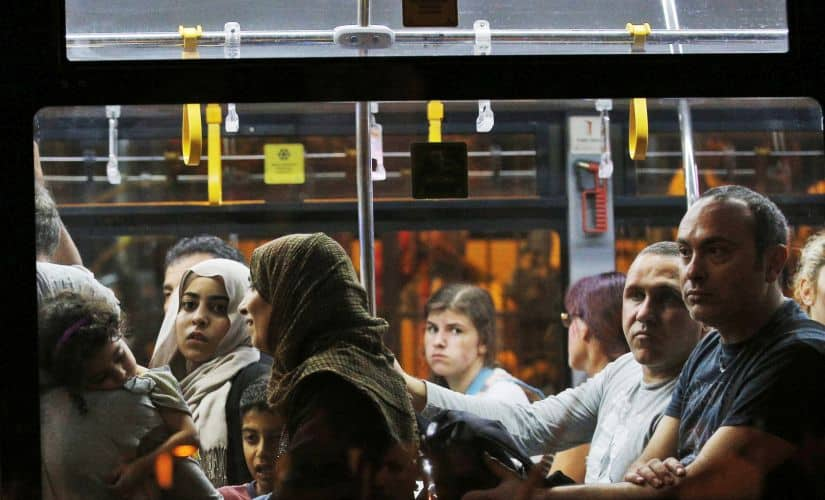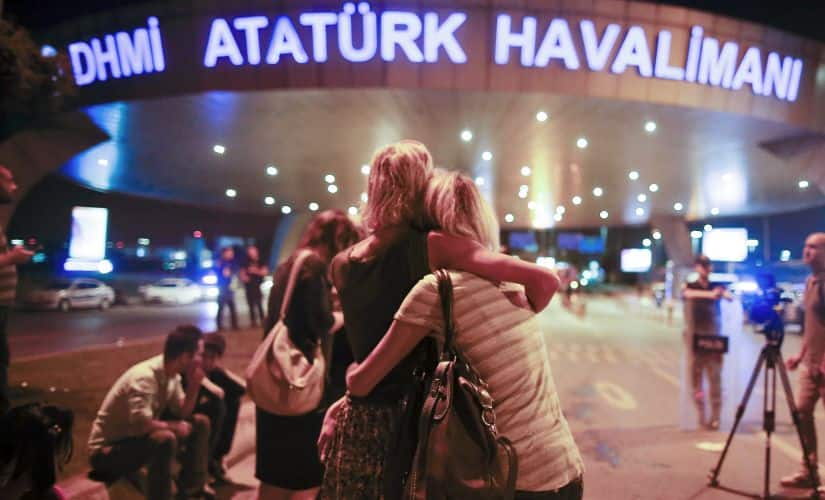On Tuesday, Istanbul’s Ataturk Airport was targeted by a group of suspected Islamic State suicide bombers killing at least 38 people and wounding many others. Turkish Prime Minister Binali Yildirim suggested that the attack was linked to what he said was Turkey’s success against Kurdish rebels as well as steps Ankara took on Monday toward mending strained ties with Israel and Russia. Turkey has suffered several bombings in recent months linked to Kurdish or Islamic State group militants. Turkey occupies a unique spot in global geopolitics and straddles between the West and Asia. In the past, Turkey has been widely criticised as being an ally of terrorism and terrorist activity because of its deliberate non-engagement/non-reaction towards fighters crossing into Syria from its borders. In Islamic State: The Digital Caliphate, Abdel Bari Atwan says that Turkey has “occupied an unenviable position of having allowed fighters and arms safe passage through its 560-mile porous borders with Syria during the civil war.” Europe’s Islamic State network responsible for the Paris and Brussels attacks also have moved through Turkey to join with the groups in Syria. Turkey and Islamic State: An inside problem [caption id=“attachment_2862192” align=“alignnone” width=“825”]  A flight’s passengers leave on a bus from Istanbul’s Ataturk airport, early Wednesday, June 29, 2016 following their evacuation after a blast. AP[/caption] Turkey and Europe also have a bittersweet relationship, according to Aaron Stein in The Islamic State in Turkey: A Deep Dive Into A Dark Place, both authorities have not been forthcoming in cooperating towards prevention of cross-border transit to and from Syria. Though Turkish authorities have made consistent efforts to crack down on Islamic State cells in the country, Stein argues that the Islamic State has well-established networks in Turkey. This too can be attributed to Turkey’s lackadaisical approach towards securing its borders and ignoring the large number of foreign fighters using Turkish territory to go in and out of Syria. According to Stein, the “well-established” networks in “funnel men and material to the Syrian civil war” and cities such as Gaziantep in Turkey’s western Anatolia region is where suicide vests and explosives used in the Islamic State attacks carried out in Turkey. While such home-grown terrorism networks are not a problem unique to Turkey, according to Stein, Turkey woke up to the danger too late — the crackdown against Islamic State networks and propaganda started very late. “Radicalisation will remain a threat to Turkey,” and drafting policies or signing air-base agreements with the West will not resolve it. Turkey’s change of heart [caption id=“attachment_2862194” align=“alignnone” width=“825”]  Passengers embrace each other at the entrance to Istanbul’s Ataturk airport. AP[/caption] Largely, a Sunni country, Turkey has been hesitant in openly declaring war against the Islamic State ever since the most tangible attacks by the Islamic State took place in Turkey in 2013. The Islamic State had threatened Turkey in 2013 with dire consequences — a series of suicide attacks — if Turkey wouldn’t reopen its Syrian border crossings. Since then, attacks grew by the multifold and in 2014, 49 Turks were abducted by Islamic State — the Turkish government first paid the Islamic State for their return and later exchanged close to 180 militants. 2014 was seminal because Turkey officially joined forces with the US to fight against the IS — this was perhaps the first such vocal move by Turkey and a clear stand against the Islamic State. In the same year, according to Atwan, Turkey joined France and Britain to develop methods to identify returning fighters who might pose a risk at home. It is also after this that the Turkish authorities decided to arm the Kurdish population in combating the IS, despite its legacy of conflict and distrust with the Kurds. According to Yonah Alexander, Dean Alexander in The Islamic State: Combating The Caliphate Without Borders, the Kurdish units have played a great role in fighting against the Islamic State. Perhaps, one of the reasons for Turkey’s reluctance to pro-actively fight the Islamic State stems from its conflict with the Kurdish forces in Syria. This had multiple consequences in the coming years, after a series of attacks in 2015, the Ankara bombings cost the lives of 102 people. In 2016, Wednesday’s attack is the fifth such attack by the Islamic State. Turkey, since 2014 has been clear about wanting to fight the Islamic State, despite the turmoil that persists within the country’s fragile cultural and economic state. With great proximity to the Islamic State, from a geographical perspective, has greater chances of striking fatal blows to the Islamic State. It’s alignment with the West and it’s strong resolve to end Islamic State (owing to the three years of attacks it has had to endure because of the Islamic State) has primed Turkey as an obvious target.
While such home-grown terrorism networks are not a problem unique to Turkey, it woke up to the danger too late.
Advertisement
End of Article
Written by Vishnupriya Bhandaram
Cultural anthropologist with a terrific nose for news. Obscure music hound. Rarely bored — always scrolling, always reading. see more


)

)
)
)
)
)
)
)
)



